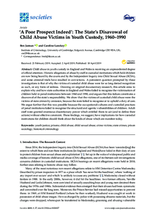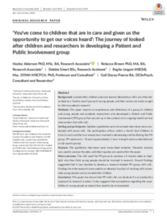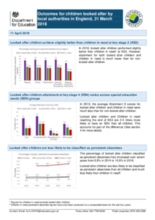

Displaying 831 - 840 of 1653
This study aims to explore how care is perceived and practiced among Looked after children and care leavers (LACCL) and those with a duty of care for them.
Drawing on original documentary research, this article aims to explain why and how state authorities in England and Wales failed to recognise the victimisation of children held in penal institutions between 1960 and 1990, and argues that this failure constitutes a disavowal of the state’s responsibility.
The authors of this article reflect on the recently published Care Crisis Review 2018, a sector‐led review, which examines the reasons for the rise in care proceedings and the number of children in care.
This open access paper reports on experiences and reflections of a group of children and young people and academic researchers who developed a Patient and Public Involvement (PPI) group that was set up in the context of an ongoing health service intervention trial with Looked after children and care leavers (denoted as LAC).
The Care Pathways and Outcomes Study is a longitudinal study following 374 children who were in care and under five years old on 31/3/2000 in Northern Ireland. The study followed where the young people ended up living, whether they returned to their birth parents, went into kinship or non-relative foster care, or were adopted.
This statistical release provides national and local authority (LA) level information on the outcomes for children who have been looked after continuously for at least 12 months at 31 March 2018, by local authorities in England.
This study uses a randomised controlled trial to examine the impact of Family Group Conferencing on caseworkers’ perceptions of families’ levels of social support.
Empirical research with social workers exploring their understandings and use of codes or ethical theories in practice remain underdeveloped in the UK. This article, based on the British Association of Social Work commissioned Enquiry into the role of the social worker in adoption with a focus on ethics and human rights, provides an important contribution in this context.
According to this article from the Irish Times, "the standard of support being provided to hundreds of children in foster care who have moderate to severe disabilities continues to be a cause of concern, the Ombudsman for Children has said."
In this article, the authors provide children’s insights into their own life experiences and individual identities. The data was collected during an ethnographic research in one of Estonia’s SOS Children’s Villages (SOS CV).



